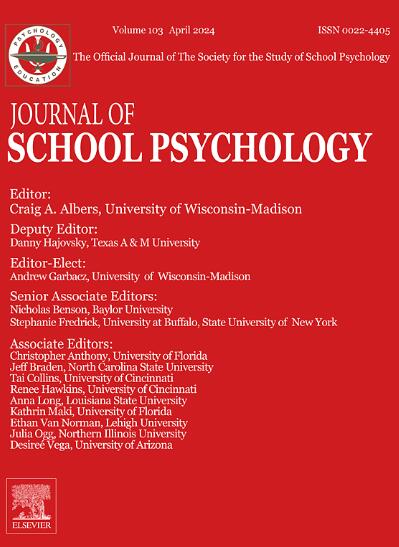Positive impacts of a universal trauma-informed intervention on student mental health: The Project POWER trial
IF 4.1
1区 心理学
Q1 PSYCHOLOGY, SOCIAL
引用次数: 0
Abstract
Effective school-based universal interventions to prevent or reduce mental health problems among upper middle school students are lacking, particularly for student populations with chronic exposure to adversity. To address this gap, we conducted an efficacy trial that compared RAP (Relax, Aware, Personal rating) Club, a trauma-informed universal intervention, with an active control health education program called Healthy Topics (HT). We hypothesized that, compared with HT, RAP Club would improve student mental health. Eighth graders across 29 public schools serving under-resourced urban communities were randomized to receive RAP Club or HT (n = 644). Both programs were delivered during school by study staff and co-facilitated by young adults from the community. Multilevel models were estimated to test group differences in self-reported mental health outcomes at post-test and 4- and 12-month follow-ups. As compared with HT, RAP Club significantly reduced post-traumatic stress disorder (PTSD) symptoms (β = −2.69, p = 0.02, d = −0.30) and trended toward reduction of depressive symptoms (β = −0.62, p = 0.05, d = −0.24) at 4-month follow up and significantly reduced symptoms of PTSD (β = −3.48, p = 0.02, d = −0.39), depression (β = −1.52, p = 0.01, d = −0.42), and anxiety (β = −3.69, p = 0.02, d = −0.36), as well as behavior problems (β = −2.19, p = 0.02, d = −0.37), at 12-month follow-up. Findings indicate RAP Club has mental health benefits for eighth graders, which increase in strength and scope across the high school transition. Future research should explore implementation strategies to promote program sustainability and scale up.
普遍创伤知情干预对学生心理健康的积极影响:POWER项目试验
缺乏有效的以学校为基础的普遍干预措施,以预防或减少高中学生的心理健康问题,特别是对于长期处于逆境中的学生群体。为了解决这一差距,我们进行了一项疗效试验,将RAP(放松,意识,个人评级)俱乐部(一种创伤知情的普遍干预措施)与积极控制的健康教育计划(称为健康话题(HT))进行比较。我们假设,与HT相比,RAP俱乐部会改善学生的心理健康。29所服务于资源不足的城市社区的公立学校的八年级学生被随机分为RAP俱乐部或HT组(n = 644)。这两个项目都是在校期间由学习人员提供的,并由社区的年轻人共同促进。在测试后和4个月和12个月的随访中,估计了多水平模型来测试自我报告的心理健康结果的组间差异。与HT相比,说唱俱乐部显著降低创伤后应激障碍(PTSD)症状(β=−2.69,p = 0.02, 0.30 d =−)和趋势减少抑郁症状(β=−0.62,p = 0.05, 0.24 d =−)在4个月的跟进和显著降低创伤后应激障碍的症状(β=−3.48,p = 0.02, 0.39 d =−)、抑郁(β=−1.52,p = 0.01, 0.42 d =−),和焦虑(β=−3.69,p = 0.02, 0.36 d =−),以及行为问题(β=−2.19,p = 0.02, 0.37 d =−),在12个月的随访。研究结果表明,RAP俱乐部对八年级学生的心理健康有益,在高中过渡期间,其强度和范围都有所增加。未来的研究应探索实施策略,以促进项目的可持续性和规模。
本文章由计算机程序翻译,如有差异,请以英文原文为准。
求助全文
约1分钟内获得全文
求助全文
来源期刊

Journal of School Psychology
PSYCHOLOGY, EDUCATIONAL-
CiteScore
6.70
自引率
8.00%
发文量
71
期刊介绍:
The Journal of School Psychology publishes original empirical articles and critical reviews of the literature on research and practices relevant to psychological and behavioral processes in school settings. JSP presents research on intervention mechanisms and approaches; schooling effects on the development of social, cognitive, mental-health, and achievement-related outcomes; assessment; and consultation. Submissions from a variety of disciplines are encouraged. All manuscripts are read by the Editor and one or more editorial consultants with the intent of providing appropriate and constructive written reviews.
 求助内容:
求助内容: 应助结果提醒方式:
应助结果提醒方式:


